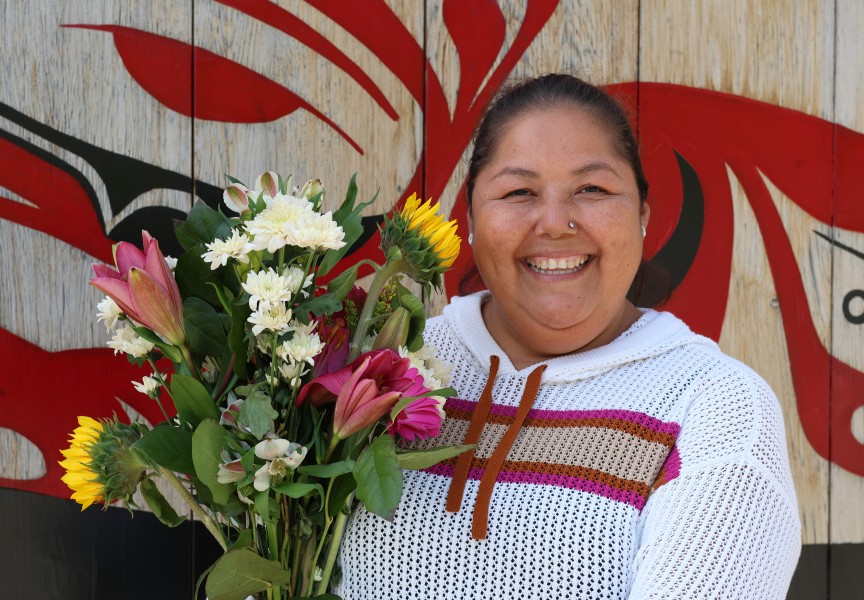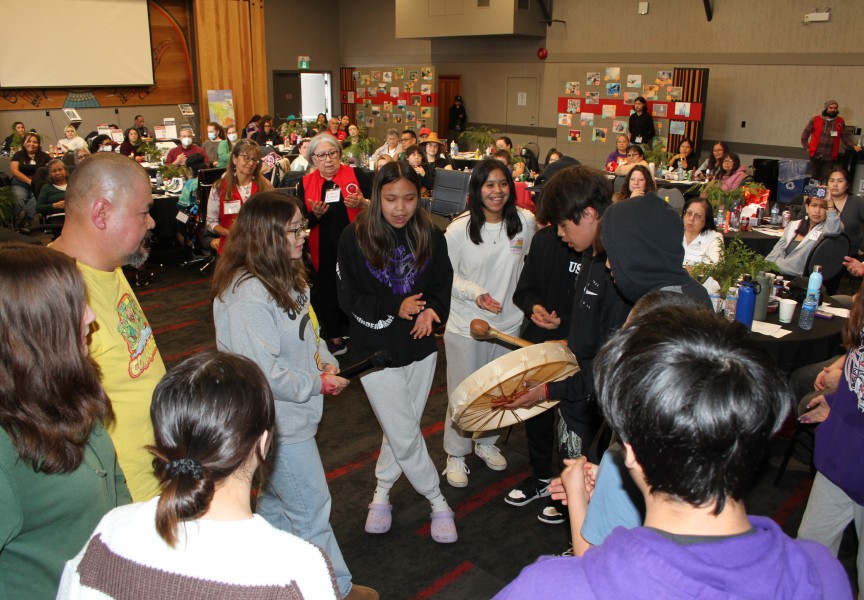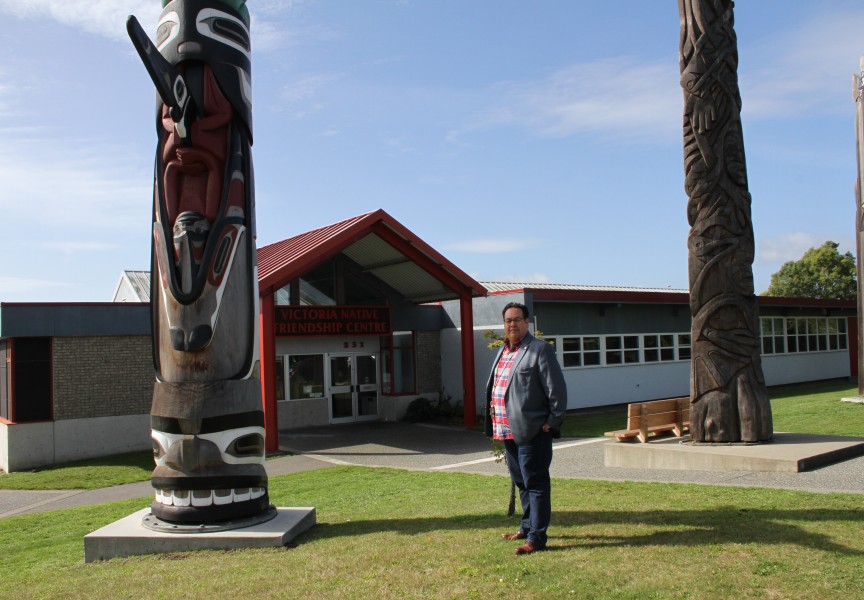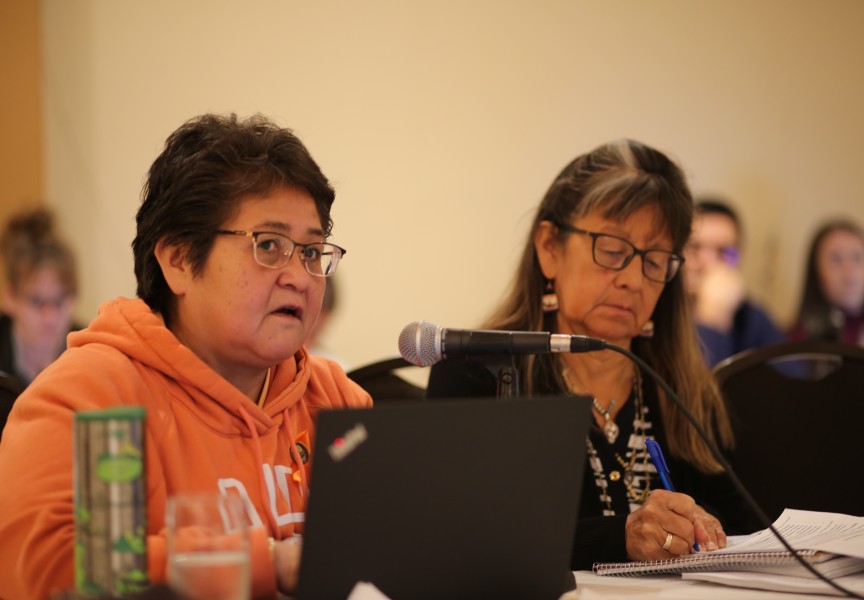BC Transit has incorporated Nuu-chah-nulth language on all the new bus stop signs within the refreshed West Coast Transit System, a historical first for the province’s official transit service provider.
Yuułuʔiłʔatḥ (Ucluelet First Nation) language keepers Marge Touchie (ʔaʔasmacy̓ak) and Jeneva Touchie (Čakʷaasiqḥw̓iłim) worked on the translations for stops within Yuułuʔiłʔatḥ traditional territory.
“It’s an honour to share language within our community, it connects us and shows that representation matters,” said Jeneva in a written statement.
Prior to the bus stop signage, Jeneva and Marge also supported the translation of street names within the municipality of Ucluelet and provided the Ucluelet Co-op with words and phrases for displays.
“Bit by bit we are incorporating more language within our community, which feels more like home. I see hope for our language as it is being widely accepted by those that live here,” wrote Jeneva.
“I am hopeful for not only our language, but all languages across B.C., which is home to many languages. It is an honour to be able to share and encourage people to learn or ask questions about the territories they live in,” she continued.
The West Coast Transit System starts and ends in the Yuułuʔiłʔatḥ community of hitaću with stops in Ucluelet, the Pacific Rim National Park Reserve, the Tla-o-qui-aht communities of Esowista and Ty-histanis and Tofino or načiqs as it’s called in Nuu-chah-nulth.
Levi Martin (kaamatḥ), Deb Masso (t̓at̓uusʔaqsa) and Luke MacDonald (t̓ap̓atc̓umaʕuk) from the Tla-o-qui-aht First Nations language department reviewed the translations for the signs within Tla-o-qui-aht territory.
“BC Transit reached out to respective nations for language translations, which is very encouraging as we understand one another but have some differences in our dialects,” said Jeneva.
Seth Wright, BC Transit’s senior manager of government relations, said the project “takes meaningful steps towards acknowledging the legacy of colonialism and is a small way we can work to unwind it.”
In June 2023, the Minister of Transportation and Infrastructure Rob Fleming sent a Mandate Letter to BC Transit with direction to work “towards lasting and meaningful Reconciliation by supporting opportunities for Indigenous Peoples to be full partners in the province we are building together, and delivering on specific commitments as outlined in the Declaration on the Rights of Indigenous Peoples Act action plan.”
“Organizationally, we take that commitment seriously,” said Wright, noting that cost wasn’t really a factor.
“It’s not about the dollar figures; it’s about building time in our timeline to build the relationships and have these meaningful conversations and do that work. It’s not work that we have historically done,” he said.
Jeneva praised BC Transit for their efforts.
“BC Transit was incredibly patient, they nudged along but understood that translations are not always a quick turnaround,” she said.
The project was largely enabled with the help of the Alberni-Clayoquot Regional District (ACRD), an organization Wright says is further along in the reconciliation journey than a lot of local governments in the province.
“I think the ACRD may be further along due to how closely we work with First Nations in our areas, and the learning we get from exercises such as this,” said Eddie Kunderman, ACRD’s operations manager.
“We have an amazing leadership team that provides decolonization training to our staff and allows us to learn and learn and learn. While we may be further along, we all still have so far to go and I think we learned some valuable lessons even in this process,” said Kunderman, adding that it might have made more sense to get all the parties in the room rather than emailing.
“Laugh, learn, talk, break bread and then work through the translations together. Next time, that is the way we will get items completed together, and truly learn about each other in the process,” he said.
Wright went on to note that the project has garnered a lot of support and enthusiasm from across the organization.
“It’s something that made sense to us. It’s the first time anywhere in the province that we’ve included any language besides English on any of our bus stop signs. We’re really excited,” Wright said.
Transition from ACRD to BC Transit takes effect March 1
Originally launched in April 2024 by the ACRD, the West Coast Transit System officially transitions to BC Transit on March 1, 2025, with five brand new 2024 Chevrolet ARBOC buses decked in green livery to showcase the organization’s commitment to “modern, climate-friendly public transit options”.
The service will continue to be operated by contractor PWTransit Canada, and according to Wright, existing drivers are staying on.
Buses are equipped with bike racks for daytime usage and some seats offer five-point seatbelts for passengers travelling with babies or toddlers.
BC Transit says the new West Coast Transit System will feature nine roundtrips with 36 stops provided on weekdays between 7 a.m. and 11 p.m., with an additional eight roundtrips each Saturday and Sunday between 7 a.m. and 9 p.m.
Riders can pay for their fare with cash and a variety of fare products available via the convenient Umo Mobility app or a reloadable Umo card.
Surfboards are unfortunately not permitted due to safety and capacity concerns.
BC Transit is also actively working on automated announcements for each stop on the West Coast, with English, French and Nuu-chah-nulth words destined to be mispronounced, equally.
“It butchers all sorts of words,” laughed Wright. “We just need to find out how to (say the word) phonetically and the computer will say it right.”
Students aged 13 and over with a valid ID and children ride the bus for free. A single ride for adults is $5 and a single ride for seniors is $2. Learn more about payment methods and prices at bctransit.com/west-coast/fares/.

















